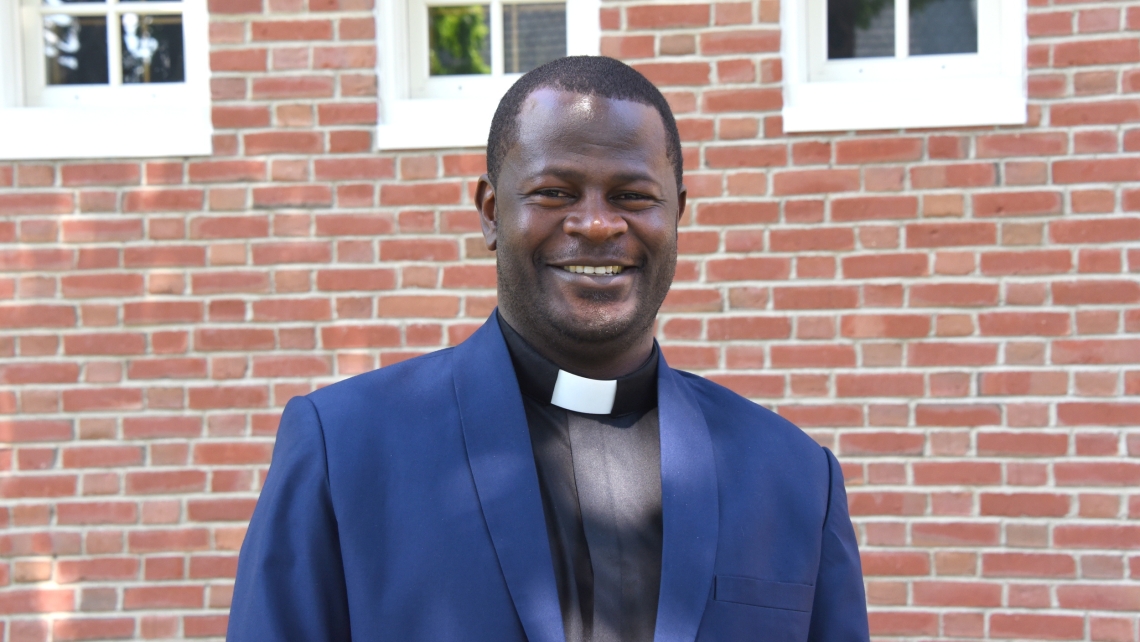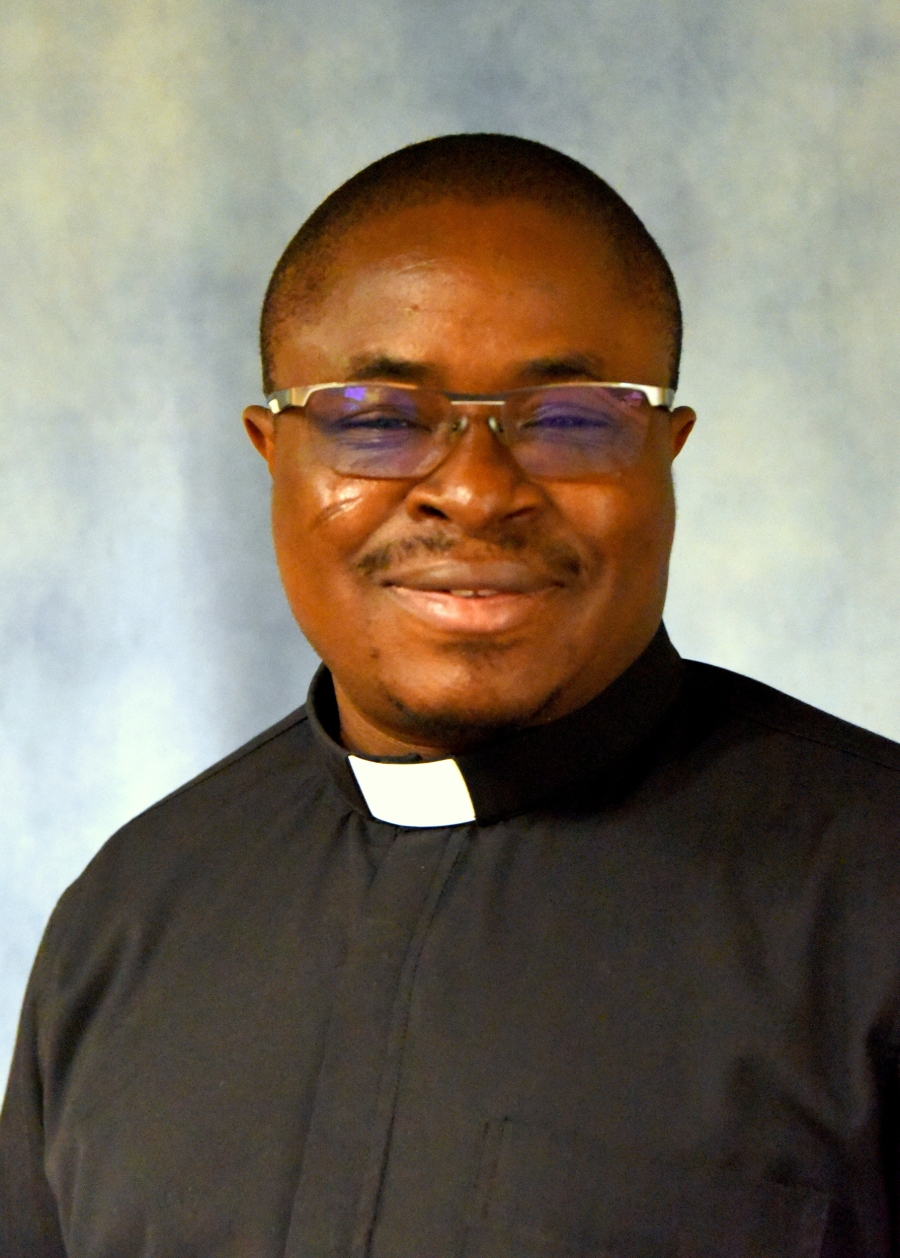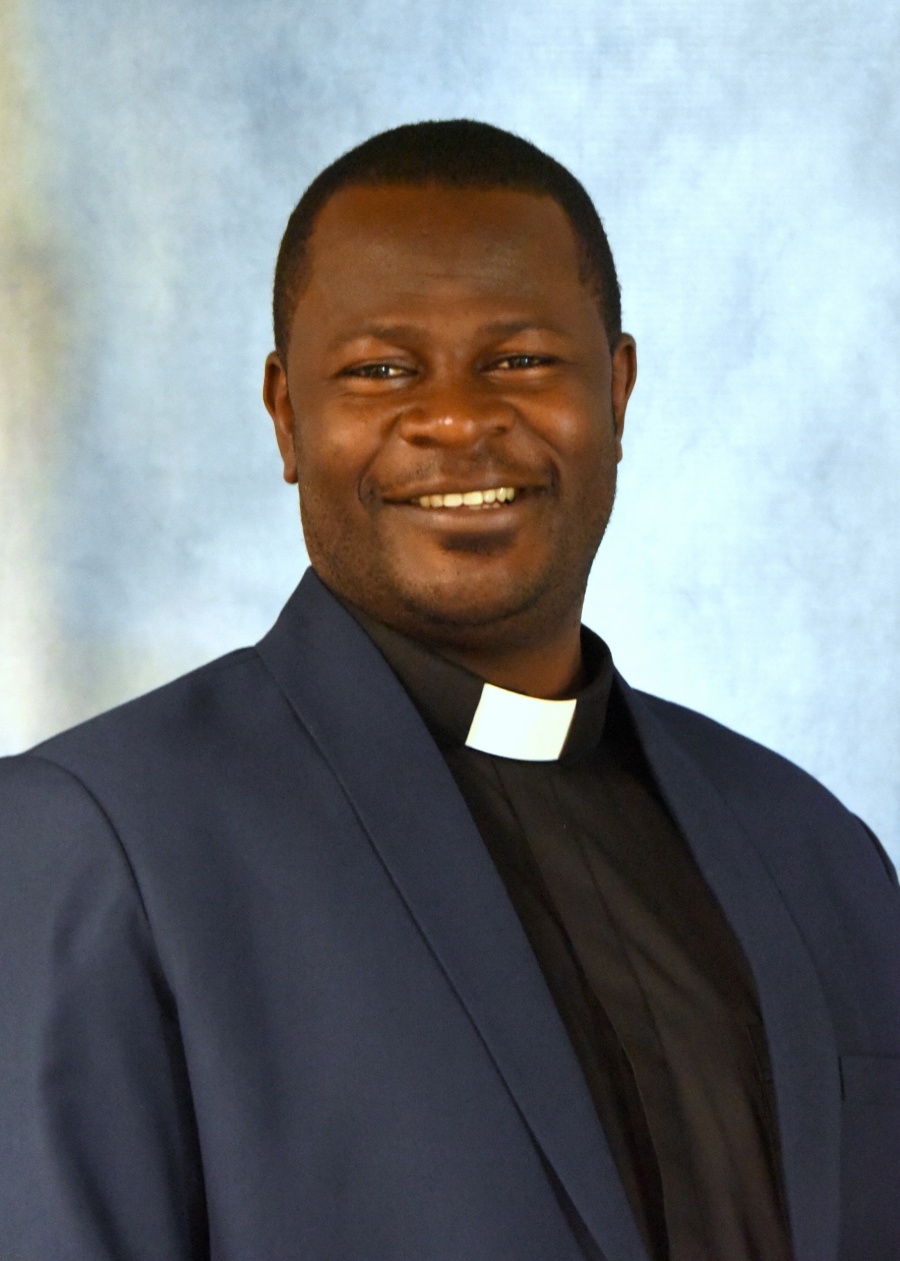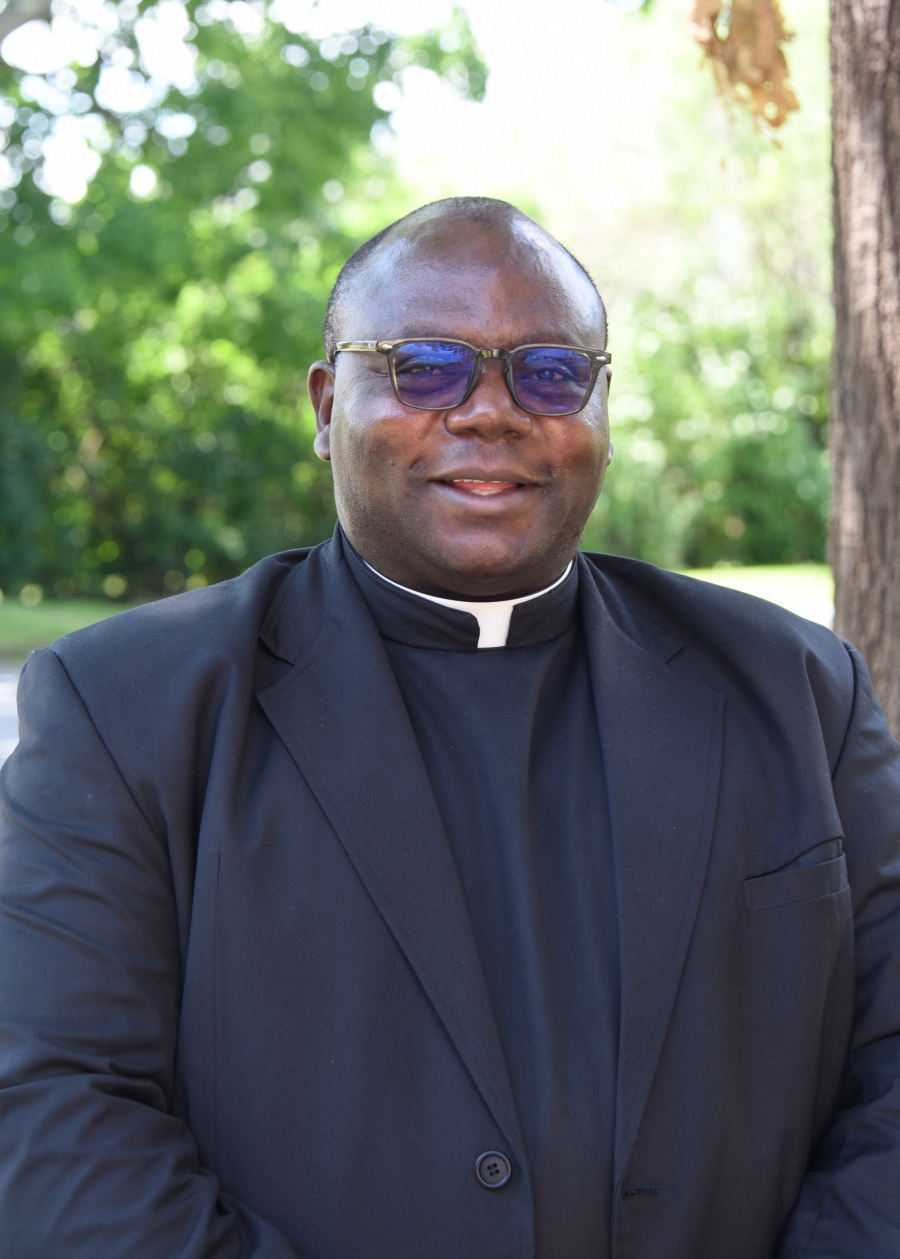Three priests from Africa welcomed to Maine

The Diocese of Portland welcomed three priests this summer, two from the Diocese of Kumbo in Cameroon and one from the Society of African Missions (SMA) who is originally from Togolese Republic (Togo).
Father Javis Nforya Laban, Father Nyohnunfon Ndukong Kilian, and Father Alou Pilizue, SMA, all say they are looking forward to serving in Maine in whatever way they can.
“In Maine, I just want to discover things as they unfold themselves,” says Father Pilizue.
“I’m looking forward to teaching the doctrine, trying to share the little that I have with my community where I will be,” says Father Laban
“It was by the grace of God that Jesus asked me to go on this mission,” says Father Ndukong. “It was a challenge for me because I never wanted to be away from my diocese, my local area, but in this, I saw the hand of God.”
Father Nyohnunfon Ndukong Kilian
Father Kilian was raised in a Catholic family in Djottin, Cameroon, and became an altar server after he made his first Communion at age 8. He says at that young age, he was already sensing a call to the priesthood.
“Altar serving helped me so much because we were always behind the priest, and we were trying to be like him,” he says. “We were all scrambling to serve.”
So much so that Father Killian says he used to get up early to make sure he was one of the first boys to arrive for the daily 6:30 a.m. Masses.
“I would get up at five o’clock to make sure I was early enough because if you are not early enough you don’t get the altar server vestments for Mass, so you went to secure it so you could be at the altar,” he says.
He also remembers, as a child, sometimes playing Mass, using biscuits for Communion.
Father Kilian says he wanted to attend Catholic school like his older siblings, but his mother died when he was nine years old, and it wasn’t possible. Still, he says, a priest would visit the government school every Thursday.
“We listened to the word of God and learned Church doctrine,” he says. “We had kind of a vocation club while in school.”
Father Kilian says he received a lot of encouragement, including from his eldest sister, who helped to raise him.
When he entered seminary, he says he found the studies to be challenging, but he persevered.
“I always kept myself going by saying, ‘Let God’s will be done.’ I put my trust in God,” he says.
He says he is thankful for the support he received.
“The vocation director at the time, too, he contributed much because of the encouragement he gave me. My parish priest, too, he encouraged me because in my whole village, I was the lone person at the time headed for major seminary,” he says.
He describes his ordination, on April 16, 2009, as being like a dream.
“It was marvelous. It was awesome for me,” he says. “‘Speak, Lord, your servant is listening.’ That is what I chose as my ordination quote, and that has helped me because I have listened all along in the course of all these years of ministry. The voices are many. The challenges are there, but I keep listening.”
Father Kilian says he sets aside time each morning to spend before the Blessed Sacrament.
“I say, ‘Lord, speak to me. My day is beginning. I don’t know how it is going to be, but talk to me.’ Gradually, He reveals things to me so that I am able to carry on throughout the day,” he says.
In addition to parish assignments, Father Kilian served as master of ceremonies for the Diocese of Kumbo for 13 years, as a manager of schools, as rector of St. Aloysius Minor Seminary, as vocations director, as dean of the Nkar Deanery, and as the national chaplain for the prayer group the Sacred Heart of Jesus and the Immaculate Heart of Mary.
He says when his bishop asked him to come to Maine, he accepted wholeheartedly.
“I told him that if it is your will, I will go,” he says. “I say, ‘Speak, Lord. Your servant is listening.’”
Father Javis Nforya Laban
Like Father Ndukong, Father Laban was raised in a Catholic family in Cameroon and was active in his church at a young age, including as an altar server. He also remembers acting out the Mass.
“I remember using my mother’s wrap to fabricate a chasuble for myself. Then, taking bottles and putting charcoal in it and using it as a thurible,” he says.
From the time he started to get to know the priests, he says they were a positive influence on him.
In high school he considered pursuing a career in journalism, which he loved, but he says the call to the priesthood was deep within him.
“I wanted to be a priest to serve, to serve God’s people,” he says.
Father Laban says both his diaconate and priestly ordinations were memorable, but unfortunately not just because of their spiritual significance. He was ordained a deacon during the Anglophone crisis in his country, and he remembers gunshots ringing out. Then, before his priestly ordination, which was delayed due to the violence, the pandemic hit, limiting attendance.
“This was the day I had been waiting for and only 10 members would see the bishop lay hands on me as a priest, so that was the difficulty we had that day, but thank God, the bishop, with his encouraging words, carried us through. It was beautiful,” he says.
Father Laban says he continues to thank God for the gift of the priesthood.
“It is a given. It is not a taken,” he says. “God gives it. You don’t take it.”
After an initial assignment as a parochial vicar at Holy Family Parish in Tabenken, Father Laban served as a parochial vicar of St. Peter and Paul’s Parish in Ngarum and was also assigned as chaplain and principal of St. John Bosco’s Comprehensive College. It was a difficult period because of the country’s Anglophone crisis.
“It was terrible. ‘The boys’ [separatists], as we called them, didn’t want school, and they said if I tried, I would see. So, the first year, I couldn’t try. The second year, I had to beg them and plead with them because sometimes they came around threatening with guns,” he says.
He says families who had the means relocated, leaving only the poor behind.
Despite the challenges, he says leaving the school behind for the assignment in Maine was difficult because of the vision he had for it.
“I just picture the next person who is coming after me there. How is he going to fare?’ he says. “At the same time, I was excited. Oh, Maine. It is a different world.”
Father Laban says he spends time before the Blessed Sacrament every morning, and when learning of his new assignment, he sought guidance.
“I asked the Lord, ‘Is it true? Are you for this? Should I go on this mission?’ And the words of Jeremiah came to me: ‘Before I formed you in your mother’s womb, I knew you, I consecrated you, sending you out into the whole world.’ And then I remembered the motto from my priestly ordination, Paul’s letter to the Philippians, Chapter 3, Verse 10: ‘All I want is to know Christ Jesus.’ I think that is what carried me along,” he says.
Father Alou Pilizue, SMA
Unlike the priests from Cameroon, Father Pilizue’s parents were not Catholic. They followed pagan beliefs. However, when SMA missionaries came to evangelize his community in northern Togo, Father Pilizue says his parents agreed to have their children baptized.
He says the missionaries would visit his family’s home, leading to a desire to follow them.
“We, as children, were free to follow them wherever they went. I wanted to follow the parish priests. The pastor who was there, he was a French SMA. He said, ‘If you want to follow me, then you have to start by being baptized. If you are baptized, then you can become an altar server and you can follow me,” explains Father Pilizue. “That is what I wanted.”
Father Pilizue says he was impressed that the priest, despite coming from Europe, spoke Kabye, the local language.
“I said if someone could come and learn our language to speak to us, it would be so interesting to be like him,” he says.
Father Pilizue believes his priestly vocation began to take hold on the day of his baptism, which occurred when he was 12 years old. He remembers the words of the Benedictine monk who had been invited by the pastor to perform the sacrament.
“He said, at the end of the Mass, ‘Among you who are baptized today, there will be priests, brothers and sisters, and even ministers, and why not the president of the country.’ When he said there is a possibility for us to become priests, I said, ‘I would like to be like you,’ because I liked his habit,” he says.
Father Pilizue began following the Benedictine, but when the monk left, he reconnected with the SMA Fathers.
During his high school years, he moved to the southern part of the country to get a job and earn money to continue his education. He says he was fortunate that there was a convent nearby and a vocation group he could join.
After high school, he sought to join the Society of African Missions.
“I wanted to be like the SMA priest who came to my village and learned the language. I wanted to do the same thing elsewhere, and to do this, I had to become a missionary priest,” he says.
He took his first vows with the Society of African Missions in 2006 and his permanent vows in 2010, just two days before his diaconate ordination.
Unfortunately, his ministry was nearly short-lived. As a deacon, he was sent to serve the Maasai people in Arasha, Tanzania, and became ill from unknowingly drinking unpasteurized milk.
“I suffered for four months, always with a headache, sweating, all that,” he says.
Initially, doctors weren’t sure what was wrong with him, which, he says, led the missionary society to question whether his health was strong enough for him to become a priest.
Once he was put on antibiotics and his condition improved, he says he was sent on a particularly challenging assignment, just to be sure he could handle it.
“It is a very rural area, no electricity, no clean water,” he says.
After six months and a positive report from the pastor, Father Anthony Korir, SMA, he was ordained.
Father Pilizue spent four years serving at a parish in San Pédro, Côte d’Ivoire, where he was also the chaplain of the Apostolate to the Sea, serving fishermen and sailors.
“The crews on the ship, most of them speak English, and I was the only priest in the city who could speak English. So, if they needed Mass or they needed to go to confession or they wanted to talk to a priest, they had to come to me,” he says.
From Côte d’Ivoire, he served in Afram-Plains North in Ghana.
“That place was more difficult than the one they sent me to in Togo. There are no roads, and it is very far from town. We don’t have electricity. We don’t have clean water. We don’t even have a network to make a call if you are in trouble,” he says. “Water had to be taken from a stream and boiled and filtered. And as for cell phone service, he says, “I climbed a tree with my phone. Then, we created a system. I just had to put my smartphone up there to get the Internet connection on it, and then leave it up there.”
He next served in Kumasi, the second largest city in Ghana, a place he says where people come to find work but don’t tend to settle once their finances improve.
“Those who are local who are living there, the majority are Muslims,” he says.
From there, Father Pilizue was briefly assigned to a parish in Champaign, Illinois, and after a sabbatical, returned to serve in the SMA American Province, and then was assigned here.
Despite the challenges he has faced, Father Pilizue says he has enjoyed serving as a missionary priest.
“Even though you face challenges, but you are still happy in that ministry, then it is your call,” he says.
He says he maintains his strong faith by paying attention to what is going on in the world and then connecting it to the word of God.
“It is very, very, very important to have the word of God at the center of your ministry,” he says. “Along with the Eucharist that we celebrate every day, we have the word of God that is guiding us in whatever we do in this world, whether in our ministry or in our relationships with others.”













